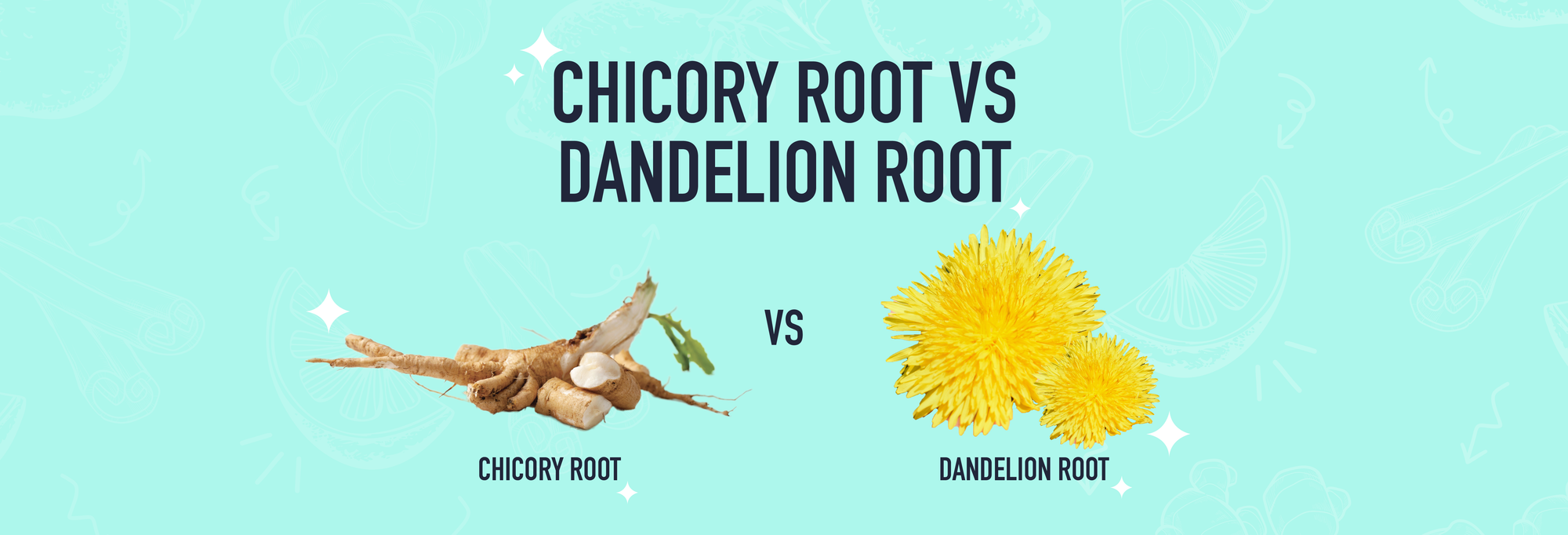

· By Lidia Moonsammy
Chicory VS Dandelion – How Do They Compare?
Chicory root and dandelion root are two popular herbal remedies that have been used for centuries. While they may have some similarities, there are also several key differences between the two. In this article, we will dive deep into the world of chicory root and dandelion root, exploring their nutritional profiles, health benefits, potential side effects, and how to incorporate them into your daily routine.
Understanding Chicory Root
Chicory root, also known as Cichorium intybus, is a perennial plant that belongs to the daisy family. Native to Europe, this plant has been widely cultivated for its roots, which are commonly used as a coffee substitute. However, chicory root offers more than just a caffeine-free alternative to coffee.
The Nutritional Profile of Chicory Root
Chicory root is packed with essential nutrients that can benefit your overall health. It is a great source of dietary fiber, which aids in digestion and promotes a healthy gut. Additionally, it contains significant amounts of vitamins A, C, and K, as well as minerals like calcium, potassium, and manganese.
Health Benefits of Chicory Root
Aside from its nutritional value, chicory root offers several potential health benefits. It has been traditionally used to stimulate appetite, promote liver health, and alleviate digestive issues such as bloating and constipation. Moreover, chicory root may have anti-inflammatory properties and can even help regulate blood sugar levels.
One notable compound found in chicory root is inulin, a type of dietary fiber that acts as a prebiotic. Prebiotics feed the beneficial bacteria in your gut, promoting a healthy microbiome and boosting immune function.
Potential Side Effects of Chicory Root
While chicory root is generally safe for consumption, there are a few potential side effects to be aware of. Some individuals may experience gastrointestinal discomfort, such as gas or diarrhea, especially when consuming large amounts of chicory root. Additionally, those with ragweed allergies should exercise caution, as chicory root is in the same plant family and may trigger allergic reactions.
How to Use Chicory Root
There are various ways to incorporate chicory root into your daily routine. One popular method is to brew it as a coffee substitute. The roasted and ground chicory root can be brewed in the same way as coffee, producing a rich, slightly nutty flavor. You can also find chicory root as an ingredient in certain teas, granolas, and dietary supplements. Experiment with different recipes to find the best way to enjoy the unique taste and potential health benefits of chicory root!
Additionally, chicory root has a long history of being used in traditional medicine. It has been employed as a natural remedy for various ailments, including liver disorders, gallstones, and even skin conditions like eczema. The active compounds present in chicory root, such as sesquiterpene lactones and flavonoids, are believed to contribute to its therapeutic properties.
A great place to find chicory root is in our Crazy D Sparkling Prebiotic beverages! High in prebiotic fiber and low in sugar, chicory root is an exceptional added food supplement. Found in our beverages, you can enjoy drinks that stimulate good gut bacteria and reduce harmful pathogenic and putrid bacteria. This prebiotic activity also contributes to enhanced absorption of minerals from an organism and increased nutrient absorption from your diet.
Diving into Dandelion Root
Dandelion root, scientifically known as Taraxacum officinale, is another herbal remedy that has gained widespread popularity. Often considered a pesky weed, dandelion actually offers a variety of potential health benefits when its root is utilized.
But did you know that dandelion root has a rich and fascinating history? Dating back centuries, it has been used in traditional medicine practices around the world. In ancient China, dandelion root was believed to have cooling properties and was used to treat fevers and infections. In Europe, it was used to support liver health and aid in digestion. Today, dandelion root continues to captivate the attention of health enthusiasts and researchers alike.
The Nutritional Makeup of Dandelion Root
Similar to chicory root, dandelion root contains numerous nutrients that contribute to its health-promoting properties. It is a rich source of vitamins A, C, and K, as well as minerals like iron, calcium, and potassium. These nutrients play important roles in supporting overall health and well-being.
But that's not all. Dandelion root is also known to possess antioxidant compounds that help combat oxidative stress in the body. These antioxidants work to neutralize harmful free radicals and protect our cells from damage. So, not only does dandelion root provide essential nutrients, but it also offers a powerful defense against the effects of aging and environmental toxins.
Health Benefits of Dandelion Root
Traditionally, dandelion root has been used to support liver health and aid in detoxification. It is believed to stimulate bile production, which aids in the digestion and absorption of fats. By supporting the liver's natural detoxification processes, dandelion root helps to rid the body of harmful substances and promote overall well-being.
But the benefits don't stop there. Dandelion root has diuretic properties, which means it can help with fluid retention and promote healthy kidney function. By increasing urine production, it assists in flushing out toxins and excess water from the body. This not only helps to reduce bloating and swelling but also supports the health of our urinary system.
Some preliminary studies suggest that dandelion root extract may possess anti-inflammatory properties and could potentially inhibit the growth of certain cancer cells. These findings are promising, but more research is needed to fully understand the extent of these benefits and their potential applications in human health.
Potential Side Effects of Dandelion Root
While dandelion root is generally safe for consumption, there are a few precautions to keep in mind. For individuals with an allergy to ragweed or other plants in the Asteraceae family, dandelion root may cause allergic reactions. It's always important to be aware of any potential allergies before incorporating new herbs or supplements into your routine.
Additionally, dandelion root may interact with certain medications, such as blood thinners or diuretics, so it is important to consult with your healthcare provider before incorporating it into your routine. They can provide personalized advice and ensure that dandelion root is safe for you to use alongside any other medications or treatments you may be taking.
How to Use Dandelion Root
There are various ways to incorporate dandelion root into your daily regimen. One popular method is to brew it as a tea. Simply steep dried dandelion root in hot water for a few minutes, strain, and enjoy. The earthy and slightly bitter flavor of dandelion root tea can be enhanced with a touch of honey or lemon, making it a soothing and refreshing beverage.
Additionally, dandelion leaves can be used in salads or soups, offering their own set of nutritional benefits. The young leaves have a slightly bitter taste, similar to arugula, and can add a unique flavor and texture to your culinary creations. Just make sure to wash them thoroughly before using, as they may have come into contact with pesticides or other contaminants.
Comparing Chicory and Dandelion Roots
Now that we have explored the individual properties of chicory root and dandelion root, let's compare them side by side to better understand their similarities and differences.
Nutritional Comparison
Both chicory root and dandelion root offer a range of essential nutrients, including vitamins and minerals. However, the specific quantities may vary. For example, chicory root tends to have higher amounts of dietary fiber, while dandelion root contains more iron.
Health Benefits Face-Off
When it comes to health benefits, both roots have their unique properties. Chicory root may be more beneficial for promoting digestive health and regulating blood sugar levels, thanks to its high inulin content. On the other hand, dandelion root is known for its potential liver-supporting properties and diuretic effects.
In conclusion, chicory root and dandelion root are two herbal remedies that provide a range of potential health benefits. While they have some similarities in terms of nutritional value and potential side effects, each root boasts its unique properties. Experiment with incorporating both chicory root and dandelion root into your daily routine to reap their potential benefits and discover which works best for you!
Don’t forget to check out our Crazy D Sparkling Prebiotic beverages and get 15% off your first purchase!
- ##ChicoryRootFiber
- ##CrazyDSoda
- ##edible
- ##FiberEnrichedDrinks
- ##fibre
- ##gut health
- ##GutHealth
- ##GutHealthDrinks
- ##health drink
- ##healthiswealth
- ##healthy
- ##HealthyBeverageChoices
- ##HealthyDrinkOptions
- ##PrebioticBeverages
- ##rootveggies
- #chicory root
- #digestion
- #digestive health
- #gut
- #gut facts
- #prebiotic
- #prebiotic drink
- #prebiotic soda
